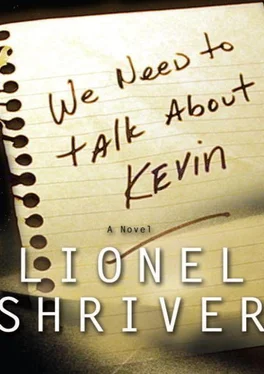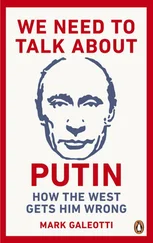In fact, when my head cleared in Beth Israel, I remembered my mother and felt ungrateful. My father had been unable to hold her hand as you held mine. Yet, offered the clasp of a living husband, I crushed it.
Still, we all know that women in labor can grow abusive, so I’m tempted to admit to having gotten a little hostile in the thick of things, and to leave my confession at that. After all, I was immediately abashed and kissed you. This was before the days when doctors slid a newborn right onto the mother’s breast, gore and all, and we had a few minutes while they tied the cord and cleaned him up. I was excited, stroking and squeezing your arm, nestling my forehead into the soft inside of your elbow. I had never held our child.
But I cannot let myself off the hook so lightly.
Up until April 11, 1983, I had flattered myself that I was an exceptional person. But since Kevin’s birth I have come to suppose that we are all profoundly normative. (For that matter, thinking of one’s self as exceptional is probably more the rule than not.) We have explicit expectations of ourselves in specific situations—beyond expectations; they are requirements. Some of these are small: If we are given a surprise party, we will be delighted. Others are sizable: If a parent dies, we will be grief-stricken. But perhaps in tandem with these expectations is the private fear that we will fail convention in the crunch. That we will receive the fateful phone call and our mother is dead and we feel nothing. I wonder if this quiet, unutterable little fear is even keener than the fear of the bad news itself: that we will discover ourselves to be monstrous. If it does not seem too shocking, for the duration of our marriage I lived with one terror: that if something happened to you it would break me. But there was always an odd shadow, an underfear, if you will, that it would not—that I would swing off blithely that afternoon to play squash.
The fact that this underfear rarely becomes overweening proceeds from a crude trust. You have to keep faith that if the unthinkable does come to pass, despair will come crashing in of its own accord; that grief, for example, is not an experience you need summon or a skill you need practice, and the same goes for prescriptive joy.
Thus even tragedy can be accompanied by a trace of relief. The discovery that heartbreak is indeed heartbreaking consoles us about our humanity (though considering what people get up to, that’s a queer word to equate with compassion, or even with emotional competence). By way of a ready example, take yesterday, Franklin. I was driving to work on Route 9W when a Fiesta turned right, cutting off a bicycle on the shoulder. The passenger door made a pretzel of the bike’s front wheel, flipping the cyclist over the roof. He landed in a position that was subtly impossible, as if sketched by an unpromising art student. I’d already driven by, but in my rearview mirror, three other cars behind me pulled onto the shoulder to help.
It seems perverse to find solace in such misfortune. Yet presumably none of the drivers who descended to ring emergency services knew this cyclist personally or had any vested interest in his fate. Still, they cared enough to inconvenience themselves potentially to the point of having to testify in court. On my own account, the drama left me physically shaken—my hands trembled on the wheel, my mouth dropped and went dry. But I had acquitted myself well. I still blanch at the agony of strangers.
Yet I do know what it’s like to get off-script. Surprise party? Funny I should have cited that. The week I was to turn ten I sensed something was up. There were whispers, a closet I was directed to avoid. If that weren’t enough wink-and-nod, Giles crooned, “You’re going to be surprised!” The second week of August I knew what signal day was approaching, and by the time it came around I was bursting.
Early afternoon of my birthday, I was ordered to the backyard.
“Surprise!” When I was invited back in, I discovered that five of my friends had been sneaked in the front while I’d been trying to peek through the drawn kitchen curtains. In our bunted living room, they surrounded a card table spread with a paper lace cloth and set with colorful paper plates, beside which my mother had placed matching seating cards inscribed with the fluid calligraphy of her professional work. There were also store-bought party favors: miniature bamboo umbrellas, noisemakers that tongued and honked. The cake, too, was from a bakery, and she had dyed the lemonade a vivid pink to make it seem more festive.
Doubtless my mother saw my face fall. Children are so lousy at covering up. At the party, I was desultory, laconic. I opened and closed my umbrella and rapidly tired of it, which was odd; I had powerfully envied other girls who had gone to parties to which I hadn’t been invited and returned to school with precisely these pink-and-blue parasols. Yet somehow it was revealed to me that they came in packets of ten in a plastic bag and could be purchased even by the likes of us, and that devalued the favors more than I could say. Two of the guests I did not much like; parents never get it right about your friends. The cake was sealed in fondant icing like a plastic puck, and flavorlessly sweet; my mother’s baking was better. There were more presents than usual, but all I remember of them is that each was unaccountably disappointing. And I was visited by a prescient taste of adulthood, an unbracketed “No Exit” sensation, which rarely plagues children: that we were sitting in a room and there was nothing to say or do. The minute it was over, the floor messy with crumbs and wrapping, I cried.
I must sound spoiled, but I wasn’t spoiled. Little had been made of my birthdays in the past. Looking back, I feel simply despicable, too. My mother had gone to so much trouble. Her business didn’t make much money for the longest time; she would labor over one card for over an hour and then sell it for a quarter, a price at which her customers would still squawk. In terms of our family’s midget economy, the outlay had been considerable. She must have been bewildered; if she were a different sort of parent, she’d have spanked my ungrateful behind. Whatever had I contemplated that in comparison made my surprise party such a letdown?
Nothing. Or nothing in particular, nothing that I could form concretely in my head. That was the problem. I had been awaiting something large and amorphous, a vast big thing so marvelous that I could not even imagine it. The party she threw was all too imaginable. For that matter, had she brought in a brass band and magicians I’d have still been crestfallen. There was no extravagance that would not have fallen short, because it would be finite and fixed, one thing and not another. It would be only what it was.
The point is, I don’t know what exactly I’d foreseen would happen to me when Kevin was first hoisted to my breast. I hadn’t foreseen anything exactly . I wanted what I could not imagine. I wanted to be transformed; I wanted to be transported. I wanted a door to open and a whole new vista to expand before me that I had never known was out there. I wanted nothing short of revelation, and revelation by its nature cannot be anticipated; it promises that to which we are not yet privy. But if I extracted one lesson from my tenth birthday party, it was that expectations are dangerous when they are both high and unformed.
I may have misrepresented myself here. Of course I had misgivings. But my expectations of motherhood were high, or I wouldn’t have agreed to go through with it. I’d attended hungrily to accounts from friends: You have no idea what it’s like until you have one of your own . Whenever I allowed that I was less than enamored of infants and small children, I was assured: I felt the same way! Couldn’t stand other people’s kids! But it’s different—it’s totally different—when they’re yours. I loved that, the prospect of another country , a strange land in which insolent miscreants were miraculously alchemized into, as you had said yourself, an answer to the “Big Question.” Indeed, I may even have misrepresented my feelings about foreign countries. Yes, I was suffering travel fatigue, and yes, I did always fight a hereditary dread before hopping a plane. But setting foot in Namibia, or Hong Kong, even Luxembourg for the first time made me high as a kite.
Читать дальше












